Vinphonic
10-03-2017, 03:05 PM
The Legacy of Japanese Composers
Kohei Tanaka
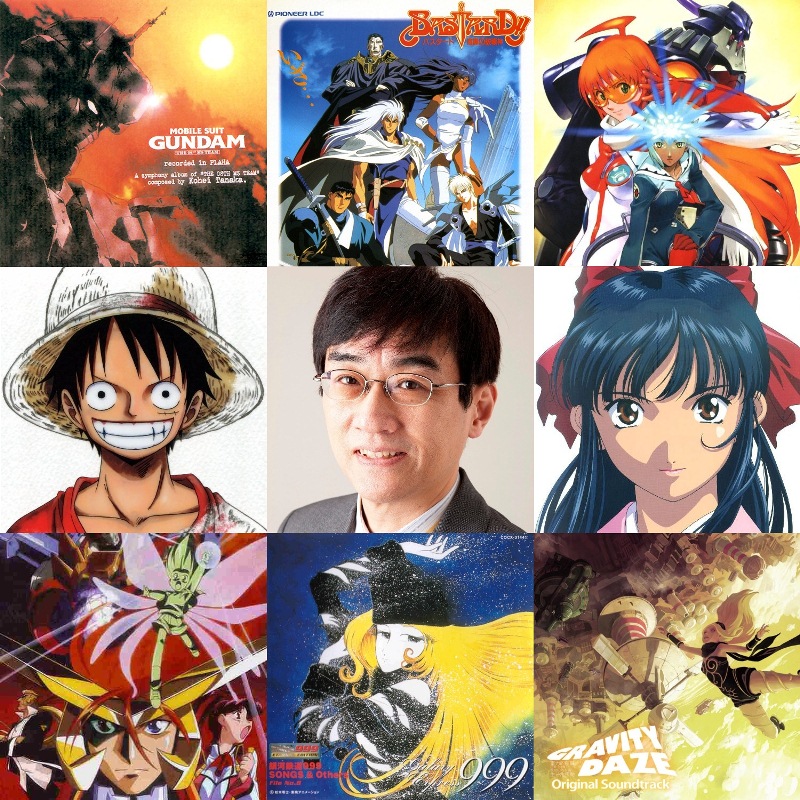
Kohei Tanaka is a living legend in the anime scoring business. The self-proclaimed “Anime-and-Game-Composer” and founder of the music company IMAGINE is one of the most well regarded voices in the Japanese scoring world. After a humble beginning as a Piano Lounge player after graduating various famous music institutions he had a few lucky encounters and ended up scoring various anime projects in the 80s and 90s. He first became famous with Gunbuster, especially the march he composed for the giant mechanoit. He enjoys to this day a successful career with many great works under his belt. Some firmly rooted in the classical and symphonic genre, others in experimenting with various music styles, like many film composers of the 80s and 90s did. He has a vast knowledge of classical music, jazz and rock and incorporated various genres and styles into his work. I first came in contact with Tanaka through the anime One Piece which I watched as a child. I always thought of it as wonderful and kind of nostalgic work and I didn’t even know why at the time. It just felt warm and comforting listening to his music. Later I would know how he was rocking his little studio ensemble together with Shiro Hamaguchi like the good old early days of American television. Back in the 50s and 60s your American studio orchestra could jam, sing and rock your socks off simultaneously. They were unbelievably skilled players and the composers they played for were equally gifted and compassionate. So whenever I listen to Tanaka’s orchestral scores I am reminded of that relentless vigor of the glory days of the orchestral score in Hollywood. Tanaka is just a great musician and person all-around in general so his music is always a pleasure to listen to. So this collection serves not only as a tribute to the man but also as an electronic archive of his music because I believe his work is important to preserve and to be as equally valuable as the work of any great film composer.
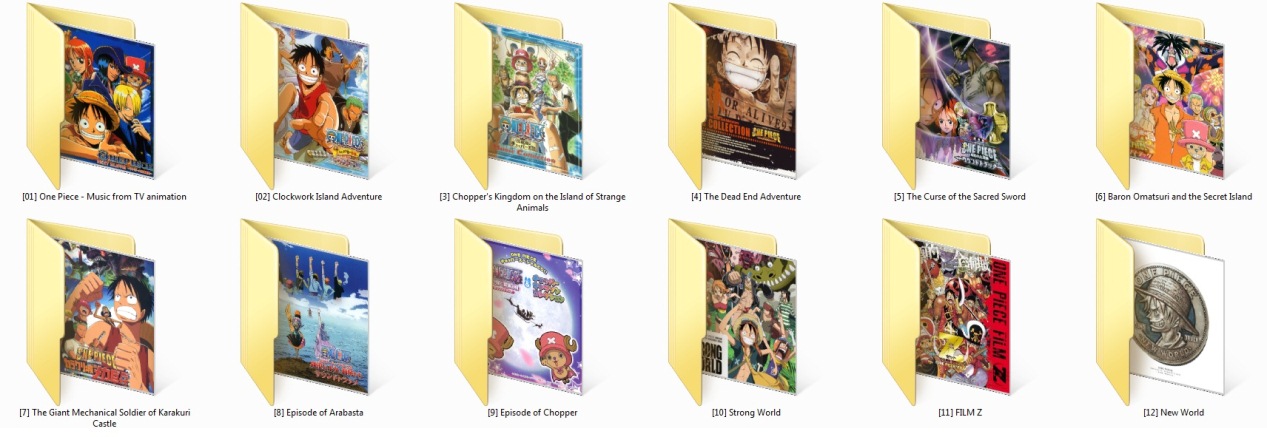
Starting of with his most recognized work (outside of Japan): One Piece. A truly massive franchise, consisting of a dozen movies and hundreds of television episodes. Tanaka served as the lead composer in a collaboration work with Shiro Hamaguchi, Yasunori Iwasaki and many more. Even an orchestral concert was performed a few years back. Tanaka is also a gifted songwriter and singer and his first television song “WE ARE” is highly popular in Japan (and around the world). I’ve reworked the entire BGM collection for the TV series and the (11) movie scores. It should be noted that while a certain movie goes into really atonal territory, Kohei Tanaka had no part in it. In general Tanaka rarely ventures into avant-garde stuff ( I wonder if it's because of his synesthesia?), so those who have an allergy to that can be save assured that it almost never happens. I still am very fond of the television score. Luffy’s Theme always manages to make me smile and “The world's number one Oden store” always pulls at my heartstrings. You can also take Film Z's Marine Hymn as Tanakas final farewell to the franchise.

Part two is another massive franchise but pretty much only famous in Japan but equally as impressive musically, if not more so than One Piece: Sakura Wars (or Sakura Taisen). Sakura Wars is perhaps the greatest orchestral thing to feature Japanese instruments and classic synth I can think of (outside of the classical world). I really respect Jerry Goldsmith’s experimentations with synth and even Tanaka has nothing but praise for the master but I think Tanaka succeeded more in combining the two. It also has to be mentioned how amazing his song writing is for the franchise. He even goes full opera, delivering kickass orchestral songs that have sort of become a special trademark of his style. Sakura Wars also gifted us with a GREAT film score, Sakura Wars: The Motion Picture… man I just love it, everything about it. The synth works just beautifully in harmony with the Tokyo Philharmonic Orchestra, a rare case for Tanaka were he got his hands on a full symphonic ensemble… and THAT KILLER THEME… it all just makes you wish he would get numerous opportunities to work on such a scale again instead of the few gems we got. For the film he also scored perhaps the most epic rollercoaster ride in cinematic history.

Speaking of gems: Part three is all about his symphonic work. In the 90s Tanaka gave us his first Symphonic Work for the television anime Bastard!! His Symphonic Poem is a wonderful venture in the fantasy genre in the vain of Poledouris’ Conan but with a delightful Spanish touch and a little bit Stravinsky. Tanaka also got a chance to score one of Japan’s most prestigious shows at the time: Mobile Suit Gundam. And he was blessed with an opportunity to arrange his TV-score as a full-fleshed symphony, performed by members of the Czech Philharmonic Orchestra. Here we can see his classic sensibilities brought to light. A fantastic introspective work, reflecting the beauty and tragedy of war. His Symphony No. 1.
Another important score worth mentioning is his film score for Galaxy Express 999 ~ Eternal Fantasy, another GREAT work where we are blessed not only with a killer theme, a mini Piano Concerto and a wonderful symbiosis of synth and opera, but also the sound of the Moscow International Philharmonic Orchestra, conducted by Konstantin Kremets. You can even regard it as his Symphonic Poem No.2 if you want. A score that gets overlooked quite often in regards to symphonic character is his score for G Gundam. Most of the score is not performed in a tiny studio but many orchestral pieces were recorded in a big hall by a symphonic ensemble. This version of the score paints an entirely different picture from the Original Soundtracks, more akin to a great orchestral film score of the 80s. For the game End of Eternity Tanaka scored the cutscenes with a big symphonic ensemble again and for all intends and purposes, it’s a full-fleshed symphonic film score. I also included Endride, while the absence of a real horn section is tragic and the score as written just screams for a big symphonic ensemble, it still manages to function as a grand symphonic fantasy adventure.

Now we venture into part IV, where most people should be familiar with Tanaka and what I call “Orchestral Busters”. Tanaka is truly the King of composers when it comes to letting the orchestra jam. Whether frantic jazz or adrenaline rushing hard rock, he always makes the various band instruments and keyboards sound like a natural part of the orchestra. Here his melodic gift also shines the brightest. His Busters have the wonderful ability to satisfy both parts of your brain which seems to be a specialty of Japanese composers in particular. But Tanaka has truly mastered the art of it. Most evident is this craft in his music for GaoGaiGar. Man… what epic and extravagant scores all-around. Such efficiency in orchestration while still being complex and serving a narrative, such brilliant incorporation of synth and rock... what a killer theme… great Leitmotif writing… at parts more fitting for 2001: A Space Odyssey than a show about punching toy robots… well you get the idea so I stop gushing now :D
For Diebuster, the sequel to Gunbuster he pretty much rerecorded the original score and expanded on it while also providing excellent new material. It should be noted that not even Tanaka is immune to copying. His theme for Nono is pretty much note for note his romantic theme from Galaxy Express. That aside his Gunbuster march is truly iconic in the anime world. I would say it’s comparable to John Williams’ Imperial March. Many upcoming Japanese composers have referenced his march (some less subtle than others). It’s not a big ensemble but then again, if you have the chops you can pretty much jam away with any ensemble and Tanaka worked his little orchestra good. He also wrote an epic tragic theme, “Seito”, it’s so great. I was really grateful Tanaka incorporated it in his Symphonic Suite for Gunbuster. In my arranged version you can hear the march in all its glory (shameless self-marketing off the list).
Now we move on to my favorite game score of his: Gravity Daze. Well if I’m honest End of Eternity is better on paper but what can I say, it’s a matter of preferences and while my brain is more satisfied after listening to EoE, Gravity Daze just makes my heart bounce every time so against my better judgement… the score is just full of vigor and character, having played the game recently on the PS4 for the first time made me realize that Tanaka needs to score more games asap. What he does with his music is what every media composer can only hope to achieve: To serve what’s on screen while simultaneously make everything work that’s on screen. The game’s art and locations are really only brought to live by Tanaka’s expertly composed score and while the orchestral parts are his A-game, it’s the combination of everything that make it work so well. “Pleasure Quarters” and “Douse Shinundakara” are just insanely catchy and while I feared the purely synth stuff would feel out of place, the exact opposite happened because the areas in which they are placed are in contrast to the games “normal” world. I of course feel pretty enthusiastic towards Gravity Daze 2 and the new anime project. Hopefully they can turn it into a franchise. Who knows, perhaps an opportunity for another symphonic score might arise then.
Moving on to Overman King Gainer and man, what an awesome testosterone driven theme song he composed for that one. The score itself is great as well, downright operatic in parts and full of classical references, for example Prokofiev’s Dance of the Knights.

The last part is about his scores which, while not perfect and of the same quality as his A-game, still outclass some composers entire portfolio. Especially Hyouka and GAD GUARD deserve special mention in how different they are from his usual work. In GAD GUARD he also really earns his title of Morricone Jr.
90s Works
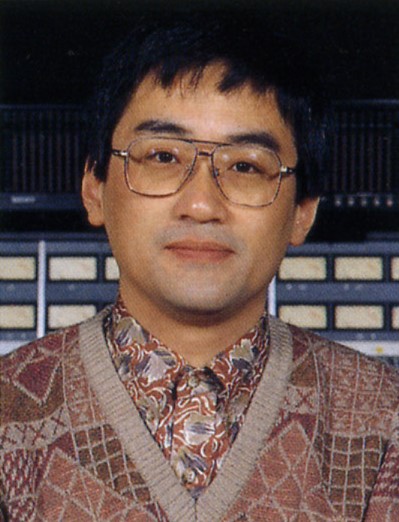
An extention of my Legacy post about Tanaka. There is much goodness in his 90s works, of course the best are Eternal Fantasy and the Praha Symphony. But his anime and game scores from that decade are also something special. He demonstrated early own that he has command over the orchestra, even on old video game soundchips. This is of course his work with a live ensemble. It's not yet the period where he really becomes one of my favorites (Sakura Wars/One Piece/GaoGaiGar Final/Chikyu Boei Kigyo Dai-Guard/Diebuster/King Gainer) but he would later expand on many ideas he had during this period: http://picosong.com/wYvw3

Download (https://mega.nz/#!GFBkjapA!Ob9jpY-XTsfs7rlRuDvPtWq0Htj-uCzzJ6gQ0UMrgDY)
The 20th Anniversary Night is all about his 90s works performed by the Tokyo Philharmonic and Tanaka himself (excluding Gunbuster of course). What I find noteworthy, even on his very first works you can hear the tendency for "screaming brass" that would find its pinnacle in Gravity Daze 30 years later. Also a fun fact: Tanaka and Hisaishi share a common history, both worked together on various syntheziser and anime albums in the 80s and early 90s. And both are an absolute joy to see performing and conducting. One became the most popular Japanese composer of all time and the master of the concert hall, the other became the master of anime music and the face of an industry. Could you have guessed that in 1986?
Wizardry V: Heart of the Maelstrom (FM Towns)
Tokyo Studio Orchestra
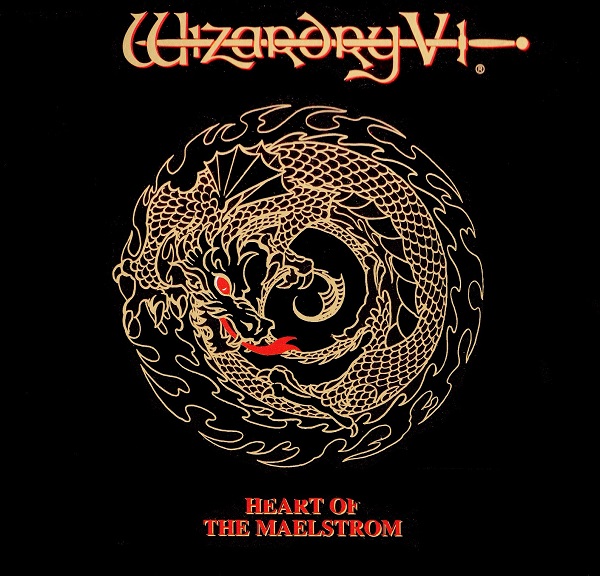
Download (https://mega.nz/#!m2oXSTIR!VFIiBiyywqb96qU064k52cLN9L71odkQJAdrzy0NTnU)
Sample (http://picosong.com/w4HPF/)
This predates Fun Kabuki-Den by three years, is a 20 minute orchestral Fantasy suite ala Bastard and thus, ladies and gentlemen, one of the oldest orchestral video game score thus far and one of the first candidates to be ever recorded with a full orchestra. The original game Wizardry V was technically released in 1988 so this could have been recorded even before the 90s! Kohei Tanaka, more of a legend with each passing year.
Encore - Violin Royale
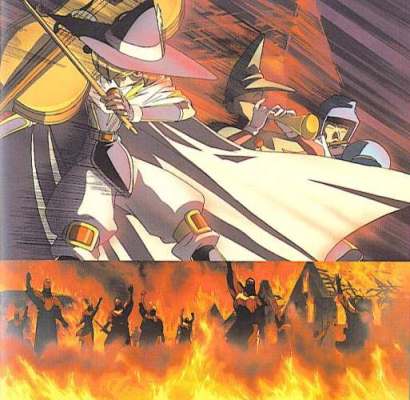
Let's end things in a classic way ;) Tanaka gives us a very much classical driven, romantic score for Hameln no Violin. But more fascinating is the classical music treasure box... what's inside?!... If you ever wondered what classical pieces would sound like with a violin as a lead or performed solo, this is for you. I also think Classicaloid won't be nearly as good.
And who could forget the greatest homage to Beethoven ever written:
But be warned, your abillity to listen to Beethoven's 7th might be forever tainted (https://www.youtube.com/watch?v=oAdr94fzNPA)
Top Wo Nerae!
Composer Profile: Kohei Tanaka
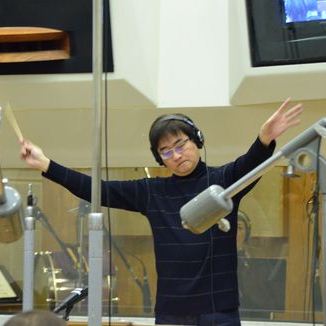
Trademark: Virtuoso, Synesthetic, Anime-and-Game-Composer , Morricone Jr.
Inspiration: Classical Repertoire, Jerry Goldsmith, John Williams, Ennio Morricone
Music Education: Tōkyō Geijutsu Daigaku, Berklee College of Music, Piano Player, Arranger, Songwriter, Singer
Worked with notable Orchestras: Tokyo Philharmonic, Czech Philharmonic
Most known work: One Piece, Gunbuster, Sakura Taisen
Melodic Sense: Terrific
Style: 80s Orchestral Film Score
Similar western composer: 80s Jerry Goldsmith
LINK IN DESCRIPTION (https://mega.nz/#!oiJ00TwC!oTX67ODhz71fGRmzm4pTQqPjaezKtR_Uamg4gBNcimc)
New releases:
GRAVITY DAZE [The Complete Recordings of 1+2]
Music composed and conducted by Kohei Tanaka
Arranged, edited and mixed by Vinphonic
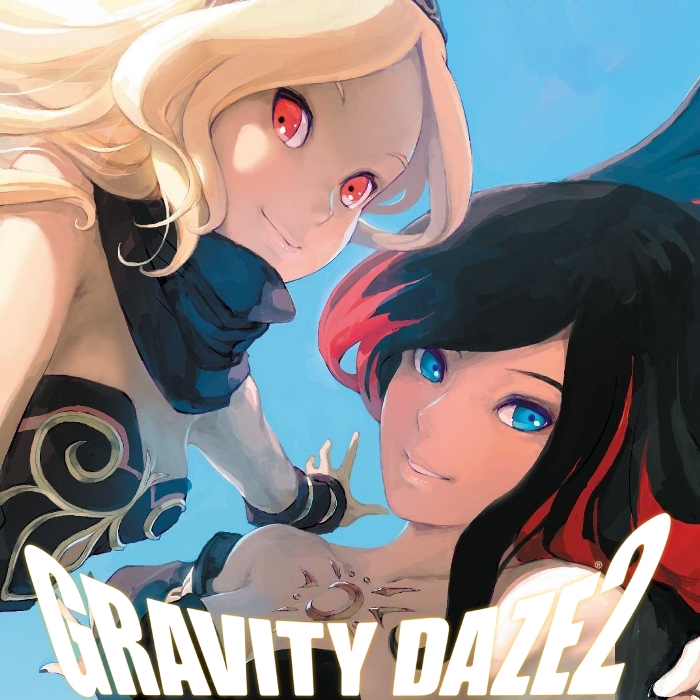
LINK IN THE DESCRIPTION (https://mega.nz/#!1m4jxRgL!EzuofBPKCvjz1huxWbLrHO44pJFdC16VKmfpsfKlils)
Fadeouts and loops be gone!!!
Gravity Daze 1+2 is one of the greatest game scores ever written from a genre mixing standpoint. The medium is rarely blessed with such good hybrid rock and jazz and here we get some of the very best in any medium in addition to Tanaka’s orchestral prowess.
This is Tanaka rocking the house with much thematic interplay, pure orchestra on and off, with a beautiful fusion of synth and orchestra only Tanaka can pull off and with truly spectacular moments from smashing guitar solos to dramatic operatic soprano. But the representation on the soundtrack albums was sorely lacking, with unecessary loops and fadeouts that detract from (my) enjoyment.
So I proudly present you a proper representation of the two scores sadly butchered on the soundtracks. I did what I could to match it as closely to the real recording session as possible, so this time there is not a single pointless loop left and the few pieces that do still loop do so naturally (meaning each version only ONCE and then a proper finish). I’ve also rearranged all pieces for a more organic narrative and combined many pieces from the two soundtracks together that work in context. Now you can listen to almost three hours of glorious music back to back without getting an epileptic seizure or anticipating the dreadful fadeout. And I did it all free of charge.
Erase the previous listening experience from your mind and take a new dive. Just pretend it's a new anime score from Tanaka-san ;)
But even without all those loops the purely orchestral score clocks around 90 minutes (GD1: 30 / GD2: 60) with another 90 minutes of fantastic orchestral rock and jazz (everything with Raven’s Theme is pure kickassery) and I hope it can now be properly enjoyed by all..
Samples:
Main Theme (http://picosong.com/GQBr)
Kat’s Theme (One Piece style) (http://picosong.com/GQZX)
Delta Team (http://picosong.com/GQZw)
Storm and Triumph (http://picosong.com/GQZC)

(63-year old Kohei Tanaka, still as vivid and exillerating as ever)
If you take into account that he did all this himself you simply have to marvel at his work here. He composed, orchestrated and performed all three hours by himself without any additional support where as other fun rides like Kid Icarus Uprising needed a batallion of composers and orchestrators to reach the same level of quality one gifted musician can achieve with pen, paper and piano.
MAKING-OF VIDEO (https://www.youtube.com/watch?v=iTNRkNepD6M)
I urge everyone to buy a copy to show your support and appreciation of the music. This is not a symphonic album but a glorious joyful outburst of music. There will also be an orchestral concert held soon with music from Gravity Daze so keep an eye out for a Studio JAPAN concert in may.
I’ll admit that Tanaka still holds a special spot in my heart for being the first Japanese composer I’ve grown to adore and idolize so naturally I’m biased as hell when it comes to his music. I would not have pulled an allnighter in my studio if I didn't absolutely love his music. He is as ever a beacon of joy to every aspiring composer, no matter the age.
Pachislot Sakura Wars ~Hot Blooded Tide~
Arranged by Kohei Tanaka, Keiji Inai, Rei Ishizuka et al
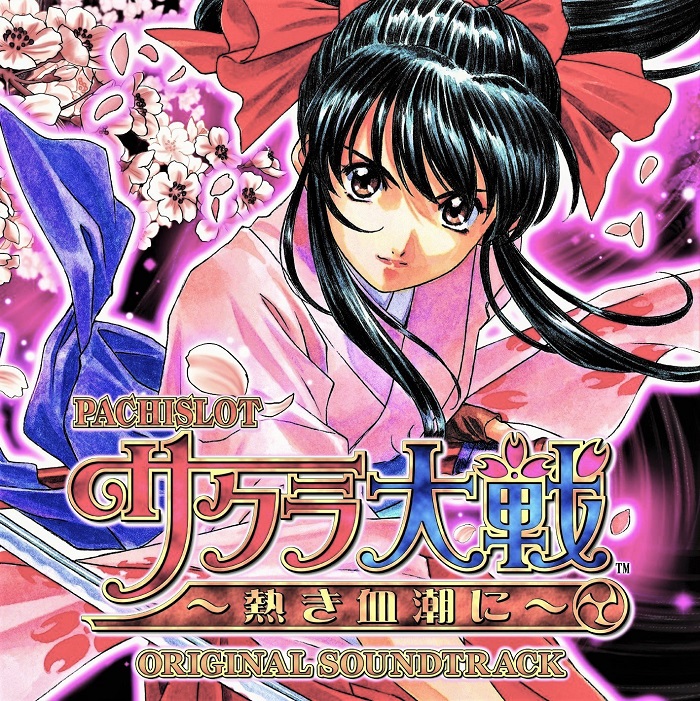
Download (https://mega.nz/#!HMQEHZRY!ug5lmvoTppagfRkgxDtCQYUbw8qTViyomwmMFbHBPDY)
Sample (http://picosong.com/wCNhm/)
MUSIC! FOR A SLOT MACHINE! Only in Japan...
It's been so long, so anticipated, so dearly wished for, but finally, this year, Sakura Wars gets its long overdue revival. A franchise so musical they hired VA's based on their lyrical singing ability, a franchise with a composer that was/is a match made in heaven. It's been years since I introduced Sakura Wars to this thread, and I still think its Tanaka's best franchise. And that believe has been reaffirmed last week when I got my hands on the newly released soundtrack for the slot machine that is part of the 20th anniversary of the franchise. There's not much in terms of BGM (its a slot machine afterall but its in GaoGaiGar territory) , the songs however, are as always with this franchise, Tanaka at his very best. There's even a fully orchestral 90s cutesy Tanaka march: http://picosong.com/wCNh8/
Planet With
Tokyo Studio Orchestra
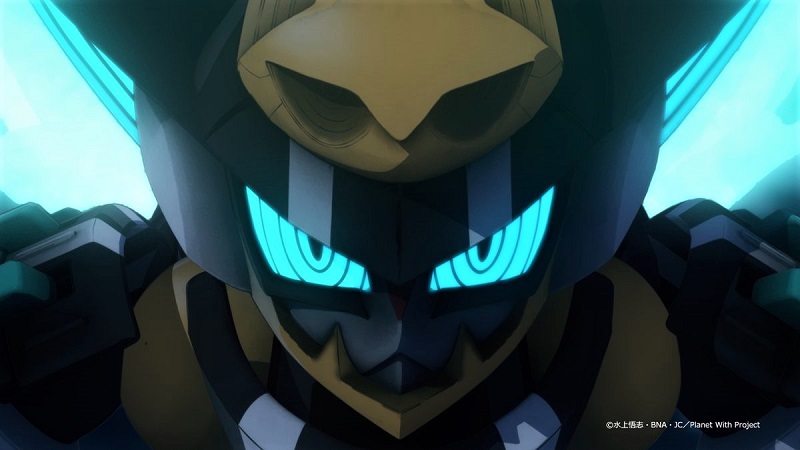
Sample (https://picosong.com/wLWNA/)
Download (https://mega.nz/#!2mgQFYDB!z0aw7j8BVMcFPUsThTCy0vVGqdtdAisUVoHGyCapgK8)
A mix of One Piece and Gravity Daze 2. This is how you rock the house. He has not even grey hair but still shows everyone how to jam, orchestra on or off. The show also was quite good, I always love that for Super Robots punching each other the message was forgiveness, and that final scene with Tanaka's evolution of love cue... just perfectly executed. I only wish it was 24 episodes long. Imagine the score we could have had. Tanaka needs to land a gig about a +24 episodes project asap. I hope among the plenty of new anime projects he has in the works one has even 50. I look forward to the other entries in this series and I hope Tanaka stays on board. Can't wait for Gunbuster 3.

He's just the best
I try a laudatio
One of the very first things I did in this thread is spread the word and music of Tanaka and how could I not after first listening to it:
Love at first sight (https://www.youtube.com/watch?v=ubrccvGOiCU)
Writing about Kohei Tanaka’s career is very difficult. Where to start? Because unlike many of his fellow great composers like Yoko Kanno, John Williams or Joe Hisaishi, it’s not the best way to truly appreciate him only with the music he has written.
He is a very special case in the long history of media scoring.
Japanese composer Kohei Tanaka is a composer who not only helped establish but perhaps also created a new genre of orchestral music and was at the very birthplace of it, right at the center.
In the 90s he gave himself the distinction of being an “Anime and Games” composer, not a “Film composer”, and has ever since made a case for the wonderful qualities of this medium in comparison to film.
His career is so vast that you could totally just focus on his career as either a video game composer or an anime composer and still be left with an enormous catalogue of great music.
He wrote the first fully orchestral video game score and was among the very first who has seen the rise of the game and anime medium to prominence in Japanese media.
Q: What do you love most about your job?
Kōhei: That’s quite difficult to answer (laughs). The thing that makes me happiest is, you know after having written a song, once you present it to fans, you know everybody is very happy to receive them, and everybody loves them so much. That’s what make me happy.
Q: Who are some of your inspirations inside of music, and outside of music?
Kōhei: If you talk about inspiration, there’s obviously lots of different sources, but predominantly when I’m sat in front of the piano everything comes to me in my head. Especially when I’m with an orchestra, I see the score fully formed in my head. So all it really is, is me writing it down on a page.
Q: Much of your work is done in anime. Why did you choose to go down that path?
Kōhei: Long story, I’ll make a summary for you (laughs). In Japan, there wasn’t really any specialists who focused solely on anime in my field, so by focusing in one area I thought that would be the best way of getting fans, and making my fans happy. Also I like anime.
In essence he is every persona a composer can have in one: A serious concert composer, a Jazz/Lounge player, a Rock musician and a film composer. His influences are as vast as his scores, from Ennio Morricone to Jerry Goldsmith to Basil Poledouris to John Williams to classical composers like Beethoven and Prokoviev to various American Jazz musicians and Rock Bands. And all these influences flow into his unique and easily recognizable style.
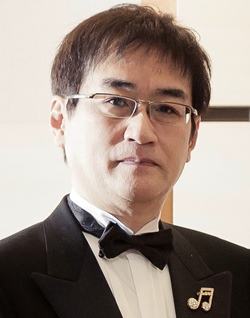
The serious concert composer persona
He had humble beginnings as a longue player after studying in Japan and America but certainly that early career made the groundwork of his joyful outburst in later years. Here is perhaps the earliest music of "Monrio Erricone Jr." you can find (courtesy of nextday):
Kohei Tanaka: The Beginning (https://www.youtube.com/watch?v=DCnIf1kckbA&feature=youtu.be)
He worked together with Joe Hisaishi in his youth on various synth arrangement albums in the 80s and wielded the baton together with Yoko Kanno in the concert hall. Nowadays he is pretty much close friends with all the classical big players in the anime scene. He collaborated with Shiro Hamaguchi on many occasions and recently with Keiji Inai.
Toshihiko Sahashi had a period in time were he rivaled him (and sometimes even surpassed him), from the late 90s to the mid 2000s, but Tanaka is a long-term player and has outlived the heights and lows of Sahashi’s, Masamichi Amano’s, Akira Senju’s and Yoko Kanno’s careers while his own is on a consistent level, joined by Michiru Oshima, and now it begins to reach a new apex with Gravity Daze 2, Planet With, Shin Sakura Taisen, One Piece Stage musical, AnimeNEXT100 and World Seeker in close proximity.
And from the 80s to this day, he has become the very face of the anime medium. Not Kanno, not Hisaishi, not Oshima, but Tanaka. He knew how to play the game best. He fully embraced the silliness of the medium, became the king of the mecha genre, from Gunbuster to Planet With, from Granzort to GaoGaiGar. He scored for Gundam twice and composed many wonderful scores from Dai-Gard to Sakura Wars (which is Steampunk-Mecha). He also landed his greatest hit in the late 90s with One Piece, which became a worldwide phenomenon, surpassing even Dragon Ball. His theme song WE ARE is to this day one of the most recognized songs from Japan and to this day he scores new music for it, together with Shiro Hamaguchi. He wrote over three hours of seafaring romance and kickass television for the TV anime and a dozen film scores.
Under his belt are some of the most iconic anime and game tunes ever written. He writes pop tunes with the same rigorous force as his “symphonies”. His musical “pop” numbers are the best in the genre, Miracle Bells and Under the Imperial Flag shining examples.
He absolutely embodies the joy of music, from operatic stageplay to killer opening to smashing guitar solo to orchestal extravaganza, Tanaka's music always steals the spotlight and overpowers every scene. Each piece, no matter the genre has his voice and there's always a piece on occasion that is just so geniously crafted.
He arranged famous classical pieces for violin and orchestra in the 90s, wrote a 30 minute symphonic poem with a piano concerto as well as a full-fleshed symphony in the 90s and he certainly has vast knowledge of the concert world, in addition to being geniously talented who can pull up anyone on the fly and play around with his music, (in addition to being a great human being)
Tanaka is truly the King of composers when it comes to letting the orchestra jam. Whether frantic jazz or adrenaline rushing hard rock, he always makes the various band instruments and keyboards sound like a natural component of the orchestra.

Tanaka on a global mission, like no composer before him.
He is now officially recognized by the Nation of Japan as the musical face and official representative of the Japanese Anime and Game industries and has been flying around the globe in recent years to various concerts, business meeting and even diplomatic state meetings, recently in Saudi-Arabia, to promote Anime and Game Music. He appears on national television a lot, conducts or sits through various concert performances of his music.
He is also an university professor scouting new talent, recently launching Yasunori Nishiki on the scene, who worked on Gravity Daze 2 as synth programmer.
Tanaka is also occupied with being company founder and head of a professional scoring company IMAGINE, with crazy amount of classical talent assembled, that right now is bombarded with job offers.
All that while appearing on numerous jam sessions, engaging and partying with fellow composers, trying his hardest for a sense of community among anime composers and scoring music with such a diverse palette of sounds and genres, painting a musical world of Gravity Daze that is one of the best aural-visual gaming experiences I had (not because of the gameplay, the world makes the game). Gravity Daze 2 is one of the greatest game scores ever written from a genre mixing standpoint. The medium is rarely blessed with such good hybrid rock and jazz and here we get some of his very best. This is Tanaka rocking the house with much thematic interplay, pure orchestra on and off, with a beautiful fusion of synth and orchestra only Tanaka can pull off and with truly spectacular moments from smashing guitar solos to dramatic operatic soprano.
A podcast about Tanaka's music that should not be missed: http://picosong.com/wfDsZ/
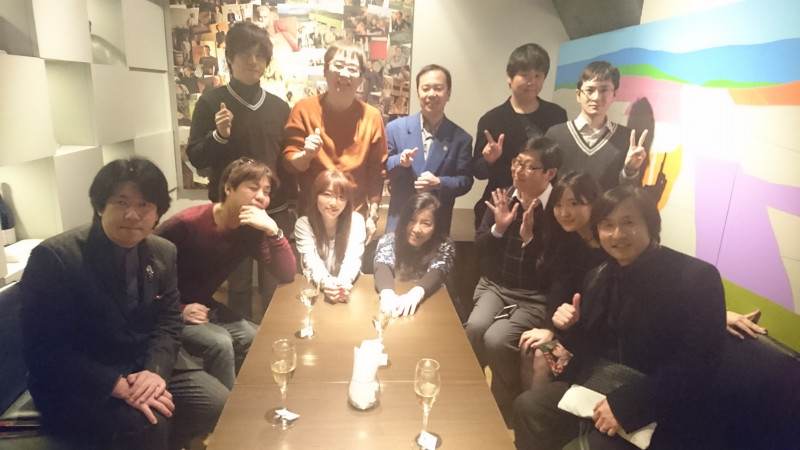
Tanaka and the Gang
He is a composer that perhaps like no other before him, burns with a passion for the medium he writes music for. Tanaka grew up a heavy nerd and Otaku, has a shop at Comiket and is a music nut, traveling to Germany as a highschoolstudent for a Wagner concert, "I'm really weird". But he never saw that as a character flaw. He completely embraced it, displaying it proudly, scoring for cheap shlock and anime about producing ecchi, at the same time as writing serious concert music, conducting with a grim face like Beethoven.
No other composer in the history of media scoring I know is such a bright, happy, warm and wonderful person you want to hang out with and share a beer yet is so proud and dashing in being a showmaster, representing a medium and defining its sound, writing thrilling pop brass tunes and symphonic SciFi with such ease yet the music is so full of notes, a rainbow of colors, a complex net of motifs and themes, the orchestra spiced-up with all kinds-of synths in a way not even one of his idols, Jerry Goldsmith achieved. A whole catalogue of operatic pieces, stageplays and symphonic works, a whole cataloge of kickass Rock and Jazz.
Here he is even composing with Vocaloid: https://www.youtube.com/watch?v=nYVyY1SFv08
Seeing him sing his own incredible pop compositions live with such passion and vigor, smiling and laughing, and then right after conduct a symphony orchestra with a stonecold serious face like Beethoven, tells me he is the living embodiment of what music is.

Kohei Tanaka is too good for a lousy Oscar
His music is kickass yet classy, symphonic yet jamming, written with exorbitant skill and phenomenal talent with an orchestra. The amount of joy he is able to evoke with his music is in correlation with his own joy of composing and "living" his music is overwhelming. He is the ideal composer for me and the perfect choice as the musical face of the anime and game music scene and industries.
May he forever remain and be remembered as a fantastic composer, a beacon of joy, a huge inspiration, a legend and my idol.
As far as his Legacy goes, I don’t want his music to be imitated, I want the torch of his joy, passion, class, skill and fun passed on to a new generation. Some with maybe a greater talent and love for the concert hall, others more fond on contemporary influences, but all with the skill to command an orchestra and every instrument they desire, inherit the greats of the past, take on a pop song with the same energy as they would a symphonic piece… and jam.
Ladies and Gentlemen, please enjoy!
Kohei Tanaka

Kohei Tanaka is a living legend in the anime scoring business. The self-proclaimed “Anime-and-Game-Composer” and founder of the music company IMAGINE is one of the most well regarded voices in the Japanese scoring world. After a humble beginning as a Piano Lounge player after graduating various famous music institutions he had a few lucky encounters and ended up scoring various anime projects in the 80s and 90s. He first became famous with Gunbuster, especially the march he composed for the giant mechanoit. He enjoys to this day a successful career with many great works under his belt. Some firmly rooted in the classical and symphonic genre, others in experimenting with various music styles, like many film composers of the 80s and 90s did. He has a vast knowledge of classical music, jazz and rock and incorporated various genres and styles into his work. I first came in contact with Tanaka through the anime One Piece which I watched as a child. I always thought of it as wonderful and kind of nostalgic work and I didn’t even know why at the time. It just felt warm and comforting listening to his music. Later I would know how he was rocking his little studio ensemble together with Shiro Hamaguchi like the good old early days of American television. Back in the 50s and 60s your American studio orchestra could jam, sing and rock your socks off simultaneously. They were unbelievably skilled players and the composers they played for were equally gifted and compassionate. So whenever I listen to Tanaka’s orchestral scores I am reminded of that relentless vigor of the glory days of the orchestral score in Hollywood. Tanaka is just a great musician and person all-around in general so his music is always a pleasure to listen to. So this collection serves not only as a tribute to the man but also as an electronic archive of his music because I believe his work is important to preserve and to be as equally valuable as the work of any great film composer.

Starting of with his most recognized work (outside of Japan): One Piece. A truly massive franchise, consisting of a dozen movies and hundreds of television episodes. Tanaka served as the lead composer in a collaboration work with Shiro Hamaguchi, Yasunori Iwasaki and many more. Even an orchestral concert was performed a few years back. Tanaka is also a gifted songwriter and singer and his first television song “WE ARE” is highly popular in Japan (and around the world). I’ve reworked the entire BGM collection for the TV series and the (11) movie scores. It should be noted that while a certain movie goes into really atonal territory, Kohei Tanaka had no part in it. In general Tanaka rarely ventures into avant-garde stuff ( I wonder if it's because of his synesthesia?), so those who have an allergy to that can be save assured that it almost never happens. I still am very fond of the television score. Luffy’s Theme always manages to make me smile and “The world's number one Oden store” always pulls at my heartstrings. You can also take Film Z's Marine Hymn as Tanakas final farewell to the franchise.

Part two is another massive franchise but pretty much only famous in Japan but equally as impressive musically, if not more so than One Piece: Sakura Wars (or Sakura Taisen). Sakura Wars is perhaps the greatest orchestral thing to feature Japanese instruments and classic synth I can think of (outside of the classical world). I really respect Jerry Goldsmith’s experimentations with synth and even Tanaka has nothing but praise for the master but I think Tanaka succeeded more in combining the two. It also has to be mentioned how amazing his song writing is for the franchise. He even goes full opera, delivering kickass orchestral songs that have sort of become a special trademark of his style. Sakura Wars also gifted us with a GREAT film score, Sakura Wars: The Motion Picture… man I just love it, everything about it. The synth works just beautifully in harmony with the Tokyo Philharmonic Orchestra, a rare case for Tanaka were he got his hands on a full symphonic ensemble… and THAT KILLER THEME… it all just makes you wish he would get numerous opportunities to work on such a scale again instead of the few gems we got. For the film he also scored perhaps the most epic rollercoaster ride in cinematic history.

Speaking of gems: Part three is all about his symphonic work. In the 90s Tanaka gave us his first Symphonic Work for the television anime Bastard!! His Symphonic Poem is a wonderful venture in the fantasy genre in the vain of Poledouris’ Conan but with a delightful Spanish touch and a little bit Stravinsky. Tanaka also got a chance to score one of Japan’s most prestigious shows at the time: Mobile Suit Gundam. And he was blessed with an opportunity to arrange his TV-score as a full-fleshed symphony, performed by members of the Czech Philharmonic Orchestra. Here we can see his classic sensibilities brought to light. A fantastic introspective work, reflecting the beauty and tragedy of war. His Symphony No. 1.
Another important score worth mentioning is his film score for Galaxy Express 999 ~ Eternal Fantasy, another GREAT work where we are blessed not only with a killer theme, a mini Piano Concerto and a wonderful symbiosis of synth and opera, but also the sound of the Moscow International Philharmonic Orchestra, conducted by Konstantin Kremets. You can even regard it as his Symphonic Poem No.2 if you want. A score that gets overlooked quite often in regards to symphonic character is his score for G Gundam. Most of the score is not performed in a tiny studio but many orchestral pieces were recorded in a big hall by a symphonic ensemble. This version of the score paints an entirely different picture from the Original Soundtracks, more akin to a great orchestral film score of the 80s. For the game End of Eternity Tanaka scored the cutscenes with a big symphonic ensemble again and for all intends and purposes, it’s a full-fleshed symphonic film score. I also included Endride, while the absence of a real horn section is tragic and the score as written just screams for a big symphonic ensemble, it still manages to function as a grand symphonic fantasy adventure.

Now we venture into part IV, where most people should be familiar with Tanaka and what I call “Orchestral Busters”. Tanaka is truly the King of composers when it comes to letting the orchestra jam. Whether frantic jazz or adrenaline rushing hard rock, he always makes the various band instruments and keyboards sound like a natural part of the orchestra. Here his melodic gift also shines the brightest. His Busters have the wonderful ability to satisfy both parts of your brain which seems to be a specialty of Japanese composers in particular. But Tanaka has truly mastered the art of it. Most evident is this craft in his music for GaoGaiGar. Man… what epic and extravagant scores all-around. Such efficiency in orchestration while still being complex and serving a narrative, such brilliant incorporation of synth and rock... what a killer theme… great Leitmotif writing… at parts more fitting for 2001: A Space Odyssey than a show about punching toy robots… well you get the idea so I stop gushing now :D
For Diebuster, the sequel to Gunbuster he pretty much rerecorded the original score and expanded on it while also providing excellent new material. It should be noted that not even Tanaka is immune to copying. His theme for Nono is pretty much note for note his romantic theme from Galaxy Express. That aside his Gunbuster march is truly iconic in the anime world. I would say it’s comparable to John Williams’ Imperial March. Many upcoming Japanese composers have referenced his march (some less subtle than others). It’s not a big ensemble but then again, if you have the chops you can pretty much jam away with any ensemble and Tanaka worked his little orchestra good. He also wrote an epic tragic theme, “Seito”, it’s so great. I was really grateful Tanaka incorporated it in his Symphonic Suite for Gunbuster. In my arranged version you can hear the march in all its glory (shameless self-marketing off the list).
Now we move on to my favorite game score of his: Gravity Daze. Well if I’m honest End of Eternity is better on paper but what can I say, it’s a matter of preferences and while my brain is more satisfied after listening to EoE, Gravity Daze just makes my heart bounce every time so against my better judgement… the score is just full of vigor and character, having played the game recently on the PS4 for the first time made me realize that Tanaka needs to score more games asap. What he does with his music is what every media composer can only hope to achieve: To serve what’s on screen while simultaneously make everything work that’s on screen. The game’s art and locations are really only brought to live by Tanaka’s expertly composed score and while the orchestral parts are his A-game, it’s the combination of everything that make it work so well. “Pleasure Quarters” and “Douse Shinundakara” are just insanely catchy and while I feared the purely synth stuff would feel out of place, the exact opposite happened because the areas in which they are placed are in contrast to the games “normal” world. I of course feel pretty enthusiastic towards Gravity Daze 2 and the new anime project. Hopefully they can turn it into a franchise. Who knows, perhaps an opportunity for another symphonic score might arise then.
Moving on to Overman King Gainer and man, what an awesome testosterone driven theme song he composed for that one. The score itself is great as well, downright operatic in parts and full of classical references, for example Prokofiev’s Dance of the Knights.

The last part is about his scores which, while not perfect and of the same quality as his A-game, still outclass some composers entire portfolio. Especially Hyouka and GAD GUARD deserve special mention in how different they are from his usual work. In GAD GUARD he also really earns his title of Morricone Jr.
90s Works

An extention of my Legacy post about Tanaka. There is much goodness in his 90s works, of course the best are Eternal Fantasy and the Praha Symphony. But his anime and game scores from that decade are also something special. He demonstrated early own that he has command over the orchestra, even on old video game soundchips. This is of course his work with a live ensemble. It's not yet the period where he really becomes one of my favorites (Sakura Wars/One Piece/GaoGaiGar Final/Chikyu Boei Kigyo Dai-Guard/Diebuster/King Gainer) but he would later expand on many ideas he had during this period: http://picosong.com/wYvw3

Download (https://mega.nz/#!GFBkjapA!Ob9jpY-XTsfs7rlRuDvPtWq0Htj-uCzzJ6gQ0UMrgDY)
The 20th Anniversary Night is all about his 90s works performed by the Tokyo Philharmonic and Tanaka himself (excluding Gunbuster of course). What I find noteworthy, even on his very first works you can hear the tendency for "screaming brass" that would find its pinnacle in Gravity Daze 30 years later. Also a fun fact: Tanaka and Hisaishi share a common history, both worked together on various syntheziser and anime albums in the 80s and early 90s. And both are an absolute joy to see performing and conducting. One became the most popular Japanese composer of all time and the master of the concert hall, the other became the master of anime music and the face of an industry. Could you have guessed that in 1986?
Wizardry V: Heart of the Maelstrom (FM Towns)
Tokyo Studio Orchestra

Download (https://mega.nz/#!m2oXSTIR!VFIiBiyywqb96qU064k52cLN9L71odkQJAdrzy0NTnU)
Sample (http://picosong.com/w4HPF/)
This predates Fun Kabuki-Den by three years, is a 20 minute orchestral Fantasy suite ala Bastard and thus, ladies and gentlemen, one of the oldest orchestral video game score thus far and one of the first candidates to be ever recorded with a full orchestra. The original game Wizardry V was technically released in 1988 so this could have been recorded even before the 90s! Kohei Tanaka, more of a legend with each passing year.
Encore - Violin Royale

Let's end things in a classic way ;) Tanaka gives us a very much classical driven, romantic score for Hameln no Violin. But more fascinating is the classical music treasure box... what's inside?!... If you ever wondered what classical pieces would sound like with a violin as a lead or performed solo, this is for you. I also think Classicaloid won't be nearly as good.
And who could forget the greatest homage to Beethoven ever written:
But be warned, your abillity to listen to Beethoven's 7th might be forever tainted (https://www.youtube.com/watch?v=oAdr94fzNPA)
Top Wo Nerae!
Composer Profile: Kohei Tanaka

Trademark: Virtuoso, Synesthetic, Anime-and-Game-Composer , Morricone Jr.
Inspiration: Classical Repertoire, Jerry Goldsmith, John Williams, Ennio Morricone
Music Education: Tōkyō Geijutsu Daigaku, Berklee College of Music, Piano Player, Arranger, Songwriter, Singer
Worked with notable Orchestras: Tokyo Philharmonic, Czech Philharmonic
Most known work: One Piece, Gunbuster, Sakura Taisen
Melodic Sense: Terrific
Style: 80s Orchestral Film Score
Similar western composer: 80s Jerry Goldsmith
LINK IN DESCRIPTION (https://mega.nz/#!oiJ00TwC!oTX67ODhz71fGRmzm4pTQqPjaezKtR_Uamg4gBNcimc)
New releases:
GRAVITY DAZE [The Complete Recordings of 1+2]
Music composed and conducted by Kohei Tanaka
Arranged, edited and mixed by Vinphonic

LINK IN THE DESCRIPTION (https://mega.nz/#!1m4jxRgL!EzuofBPKCvjz1huxWbLrHO44pJFdC16VKmfpsfKlils)
Fadeouts and loops be gone!!!
Gravity Daze 1+2 is one of the greatest game scores ever written from a genre mixing standpoint. The medium is rarely blessed with such good hybrid rock and jazz and here we get some of the very best in any medium in addition to Tanaka’s orchestral prowess.
This is Tanaka rocking the house with much thematic interplay, pure orchestra on and off, with a beautiful fusion of synth and orchestra only Tanaka can pull off and with truly spectacular moments from smashing guitar solos to dramatic operatic soprano. But the representation on the soundtrack albums was sorely lacking, with unecessary loops and fadeouts that detract from (my) enjoyment.
So I proudly present you a proper representation of the two scores sadly butchered on the soundtracks. I did what I could to match it as closely to the real recording session as possible, so this time there is not a single pointless loop left and the few pieces that do still loop do so naturally (meaning each version only ONCE and then a proper finish). I’ve also rearranged all pieces for a more organic narrative and combined many pieces from the two soundtracks together that work in context. Now you can listen to almost three hours of glorious music back to back without getting an epileptic seizure or anticipating the dreadful fadeout. And I did it all free of charge.
Erase the previous listening experience from your mind and take a new dive. Just pretend it's a new anime score from Tanaka-san ;)
But even without all those loops the purely orchestral score clocks around 90 minutes (GD1: 30 / GD2: 60) with another 90 minutes of fantastic orchestral rock and jazz (everything with Raven’s Theme is pure kickassery) and I hope it can now be properly enjoyed by all..
Samples:
Main Theme (http://picosong.com/GQBr)
Kat’s Theme (One Piece style) (http://picosong.com/GQZX)
Delta Team (http://picosong.com/GQZw)
Storm and Triumph (http://picosong.com/GQZC)

(63-year old Kohei Tanaka, still as vivid and exillerating as ever)
If you take into account that he did all this himself you simply have to marvel at his work here. He composed, orchestrated and performed all three hours by himself without any additional support where as other fun rides like Kid Icarus Uprising needed a batallion of composers and orchestrators to reach the same level of quality one gifted musician can achieve with pen, paper and piano.
MAKING-OF VIDEO (https://www.youtube.com/watch?v=iTNRkNepD6M)
I urge everyone to buy a copy to show your support and appreciation of the music. This is not a symphonic album but a glorious joyful outburst of music. There will also be an orchestral concert held soon with music from Gravity Daze so keep an eye out for a Studio JAPAN concert in may.
I’ll admit that Tanaka still holds a special spot in my heart for being the first Japanese composer I’ve grown to adore and idolize so naturally I’m biased as hell when it comes to his music. I would not have pulled an allnighter in my studio if I didn't absolutely love his music. He is as ever a beacon of joy to every aspiring composer, no matter the age.
Pachislot Sakura Wars ~Hot Blooded Tide~
Arranged by Kohei Tanaka, Keiji Inai, Rei Ishizuka et al

Download (https://mega.nz/#!HMQEHZRY!ug5lmvoTppagfRkgxDtCQYUbw8qTViyomwmMFbHBPDY)
Sample (http://picosong.com/wCNhm/)
MUSIC! FOR A SLOT MACHINE! Only in Japan...
It's been so long, so anticipated, so dearly wished for, but finally, this year, Sakura Wars gets its long overdue revival. A franchise so musical they hired VA's based on their lyrical singing ability, a franchise with a composer that was/is a match made in heaven. It's been years since I introduced Sakura Wars to this thread, and I still think its Tanaka's best franchise. And that believe has been reaffirmed last week when I got my hands on the newly released soundtrack for the slot machine that is part of the 20th anniversary of the franchise. There's not much in terms of BGM (its a slot machine afterall but its in GaoGaiGar territory) , the songs however, are as always with this franchise, Tanaka at his very best. There's even a fully orchestral 90s cutesy Tanaka march: http://picosong.com/wCNh8/
Planet With
Tokyo Studio Orchestra

Sample (https://picosong.com/wLWNA/)
Download (https://mega.nz/#!2mgQFYDB!z0aw7j8BVMcFPUsThTCy0vVGqdtdAisUVoHGyCapgK8)
A mix of One Piece and Gravity Daze 2. This is how you rock the house. He has not even grey hair but still shows everyone how to jam, orchestra on or off. The show also was quite good, I always love that for Super Robots punching each other the message was forgiveness, and that final scene with Tanaka's evolution of love cue... just perfectly executed. I only wish it was 24 episodes long. Imagine the score we could have had. Tanaka needs to land a gig about a +24 episodes project asap. I hope among the plenty of new anime projects he has in the works one has even 50. I look forward to the other entries in this series and I hope Tanaka stays on board. Can't wait for Gunbuster 3.

He's just the best
I try a laudatio
One of the very first things I did in this thread is spread the word and music of Tanaka and how could I not after first listening to it:
Love at first sight (https://www.youtube.com/watch?v=ubrccvGOiCU)
Writing about Kohei Tanaka’s career is very difficult. Where to start? Because unlike many of his fellow great composers like Yoko Kanno, John Williams or Joe Hisaishi, it’s not the best way to truly appreciate him only with the music he has written.
He is a very special case in the long history of media scoring.
Japanese composer Kohei Tanaka is a composer who not only helped establish but perhaps also created a new genre of orchestral music and was at the very birthplace of it, right at the center.
In the 90s he gave himself the distinction of being an “Anime and Games” composer, not a “Film composer”, and has ever since made a case for the wonderful qualities of this medium in comparison to film.
His career is so vast that you could totally just focus on his career as either a video game composer or an anime composer and still be left with an enormous catalogue of great music.
He wrote the first fully orchestral video game score and was among the very first who has seen the rise of the game and anime medium to prominence in Japanese media.
Q: What do you love most about your job?
Kōhei: That’s quite difficult to answer (laughs). The thing that makes me happiest is, you know after having written a song, once you present it to fans, you know everybody is very happy to receive them, and everybody loves them so much. That’s what make me happy.
Q: Who are some of your inspirations inside of music, and outside of music?
Kōhei: If you talk about inspiration, there’s obviously lots of different sources, but predominantly when I’m sat in front of the piano everything comes to me in my head. Especially when I’m with an orchestra, I see the score fully formed in my head. So all it really is, is me writing it down on a page.
Q: Much of your work is done in anime. Why did you choose to go down that path?
Kōhei: Long story, I’ll make a summary for you (laughs). In Japan, there wasn’t really any specialists who focused solely on anime in my field, so by focusing in one area I thought that would be the best way of getting fans, and making my fans happy. Also I like anime.
In essence he is every persona a composer can have in one: A serious concert composer, a Jazz/Lounge player, a Rock musician and a film composer. His influences are as vast as his scores, from Ennio Morricone to Jerry Goldsmith to Basil Poledouris to John Williams to classical composers like Beethoven and Prokoviev to various American Jazz musicians and Rock Bands. And all these influences flow into his unique and easily recognizable style.

The serious concert composer persona
He had humble beginnings as a longue player after studying in Japan and America but certainly that early career made the groundwork of his joyful outburst in later years. Here is perhaps the earliest music of "Monrio Erricone Jr." you can find (courtesy of nextday):
Kohei Tanaka: The Beginning (https://www.youtube.com/watch?v=DCnIf1kckbA&feature=youtu.be)
He worked together with Joe Hisaishi in his youth on various synth arrangement albums in the 80s and wielded the baton together with Yoko Kanno in the concert hall. Nowadays he is pretty much close friends with all the classical big players in the anime scene. He collaborated with Shiro Hamaguchi on many occasions and recently with Keiji Inai.
Toshihiko Sahashi had a period in time were he rivaled him (and sometimes even surpassed him), from the late 90s to the mid 2000s, but Tanaka is a long-term player and has outlived the heights and lows of Sahashi’s, Masamichi Amano’s, Akira Senju’s and Yoko Kanno’s careers while his own is on a consistent level, joined by Michiru Oshima, and now it begins to reach a new apex with Gravity Daze 2, Planet With, Shin Sakura Taisen, One Piece Stage musical, AnimeNEXT100 and World Seeker in close proximity.
And from the 80s to this day, he has become the very face of the anime medium. Not Kanno, not Hisaishi, not Oshima, but Tanaka. He knew how to play the game best. He fully embraced the silliness of the medium, became the king of the mecha genre, from Gunbuster to Planet With, from Granzort to GaoGaiGar. He scored for Gundam twice and composed many wonderful scores from Dai-Gard to Sakura Wars (which is Steampunk-Mecha). He also landed his greatest hit in the late 90s with One Piece, which became a worldwide phenomenon, surpassing even Dragon Ball. His theme song WE ARE is to this day one of the most recognized songs from Japan and to this day he scores new music for it, together with Shiro Hamaguchi. He wrote over three hours of seafaring romance and kickass television for the TV anime and a dozen film scores.
Under his belt are some of the most iconic anime and game tunes ever written. He writes pop tunes with the same rigorous force as his “symphonies”. His musical “pop” numbers are the best in the genre, Miracle Bells and Under the Imperial Flag shining examples.
He absolutely embodies the joy of music, from operatic stageplay to killer opening to smashing guitar solo to orchestal extravaganza, Tanaka's music always steals the spotlight and overpowers every scene. Each piece, no matter the genre has his voice and there's always a piece on occasion that is just so geniously crafted.
He arranged famous classical pieces for violin and orchestra in the 90s, wrote a 30 minute symphonic poem with a piano concerto as well as a full-fleshed symphony in the 90s and he certainly has vast knowledge of the concert world, in addition to being geniously talented who can pull up anyone on the fly and play around with his music, (in addition to being a great human being)
Tanaka is truly the King of composers when it comes to letting the orchestra jam. Whether frantic jazz or adrenaline rushing hard rock, he always makes the various band instruments and keyboards sound like a natural component of the orchestra.

Tanaka on a global mission, like no composer before him.
He is now officially recognized by the Nation of Japan as the musical face and official representative of the Japanese Anime and Game industries and has been flying around the globe in recent years to various concerts, business meeting and even diplomatic state meetings, recently in Saudi-Arabia, to promote Anime and Game Music. He appears on national television a lot, conducts or sits through various concert performances of his music.
He is also an university professor scouting new talent, recently launching Yasunori Nishiki on the scene, who worked on Gravity Daze 2 as synth programmer.
Tanaka is also occupied with being company founder and head of a professional scoring company IMAGINE, with crazy amount of classical talent assembled, that right now is bombarded with job offers.
All that while appearing on numerous jam sessions, engaging and partying with fellow composers, trying his hardest for a sense of community among anime composers and scoring music with such a diverse palette of sounds and genres, painting a musical world of Gravity Daze that is one of the best aural-visual gaming experiences I had (not because of the gameplay, the world makes the game). Gravity Daze 2 is one of the greatest game scores ever written from a genre mixing standpoint. The medium is rarely blessed with such good hybrid rock and jazz and here we get some of his very best. This is Tanaka rocking the house with much thematic interplay, pure orchestra on and off, with a beautiful fusion of synth and orchestra only Tanaka can pull off and with truly spectacular moments from smashing guitar solos to dramatic operatic soprano.
A podcast about Tanaka's music that should not be missed: http://picosong.com/wfDsZ/

Tanaka and the Gang
He is a composer that perhaps like no other before him, burns with a passion for the medium he writes music for. Tanaka grew up a heavy nerd and Otaku, has a shop at Comiket and is a music nut, traveling to Germany as a highschoolstudent for a Wagner concert, "I'm really weird". But he never saw that as a character flaw. He completely embraced it, displaying it proudly, scoring for cheap shlock and anime about producing ecchi, at the same time as writing serious concert music, conducting with a grim face like Beethoven.
No other composer in the history of media scoring I know is such a bright, happy, warm and wonderful person you want to hang out with and share a beer yet is so proud and dashing in being a showmaster, representing a medium and defining its sound, writing thrilling pop brass tunes and symphonic SciFi with such ease yet the music is so full of notes, a rainbow of colors, a complex net of motifs and themes, the orchestra spiced-up with all kinds-of synths in a way not even one of his idols, Jerry Goldsmith achieved. A whole catalogue of operatic pieces, stageplays and symphonic works, a whole cataloge of kickass Rock and Jazz.
Here he is even composing with Vocaloid: https://www.youtube.com/watch?v=nYVyY1SFv08
Seeing him sing his own incredible pop compositions live with such passion and vigor, smiling and laughing, and then right after conduct a symphony orchestra with a stonecold serious face like Beethoven, tells me he is the living embodiment of what music is.

Kohei Tanaka is too good for a lousy Oscar
His music is kickass yet classy, symphonic yet jamming, written with exorbitant skill and phenomenal talent with an orchestra. The amount of joy he is able to evoke with his music is in correlation with his own joy of composing and "living" his music is overwhelming. He is the ideal composer for me and the perfect choice as the musical face of the anime and game music scene and industries.
May he forever remain and be remembered as a fantastic composer, a beacon of joy, a huge inspiration, a legend and my idol.
As far as his Legacy goes, I don’t want his music to be imitated, I want the torch of his joy, passion, class, skill and fun passed on to a new generation. Some with maybe a greater talent and love for the concert hall, others more fond on contemporary influences, but all with the skill to command an orchestra and every instrument they desire, inherit the greats of the past, take on a pop song with the same energy as they would a symphonic piece… and jam.
Ladies and Gentlemen, please enjoy!